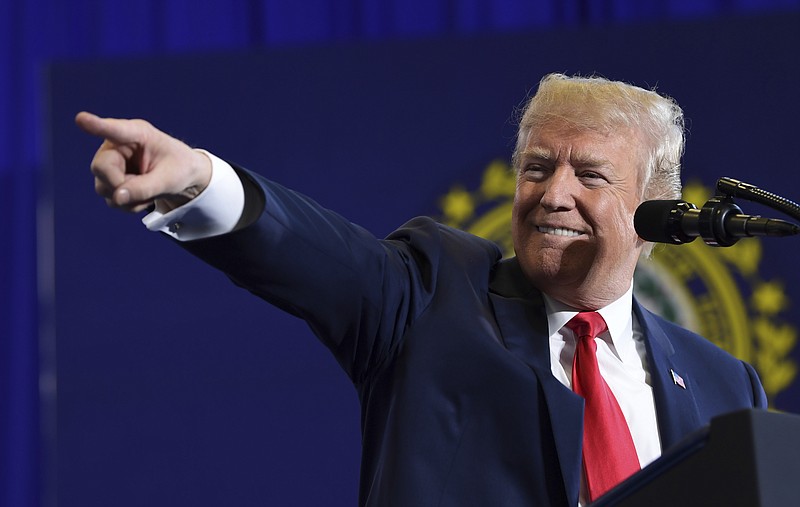MANCHESTER, N.H. (AP) - Unveiling a long-awaited plan to combat the national scourge of opioid drug addiction, President Donald Trump called Monday for stiffer penalties for drug traffickers, including embracing a tactic employed by some of the global strongmen he admires: the death penalty.
The president traveled to New Hampshire, a state ravaged by opioids and which is also an early marker for the re-election campaign he has already announced. The president called for broadening awareness about drug addiction while expanding access to proven treatment and recovery efforts, but the backbone of his plan is to toughen the punishment for those caught trafficking highly addictive drugs.
"This isn't about nice anymore," Trump said. "This is about winning a very, very tough problem and if we don't get very tough on these dealers it's not going to happen folks. I want to win this battle."
The president formalized what he had long mused about publicly and privately: that if a person in the U.S. can get the death penalty or life in prison for shooting one person, a similar punishment should be given to a drug dealer who potentially kills thousands.
Trump has long spoken approvingly about countries like Singapore that have fewer issues with drug addiction because they harshly punish their dealers.
"Drug traffickers kill so many thousands of our citizens every year," Trump said. "That's why my Department of Justice will be seeking so many tougher penalties than we've ever had and we'll be focusing on the penalties that I talked about previously for big pushers, the ones that are killing so many people, and that penalty is going to be the death penalty.
"Other countries don't play games. But the ultimate penalty has to be the death penalty."
The Justice Department said the federal death penalty is available for limited drug-related offenses, including violations of the "drug kingpin" provisions in federal law.
It is not clear if the death penalty, even for traffickers whose product causes multiple deaths, would be constitutional. Doug Berman, a law professor at Ohio State University, predicted the issue would be litigated all the way to the U.S. Supreme Court.
John Blume, a professor and director of Cornell Law School's death penalty program, said the Federal Drug Kingpin Act has yielded few "kingpins" or major dealers, mostly ensnaring mid- to low-level minorities involved in the drug trade.
Opioids, including prescription opioids, heroin and synthetic drugs such as fentanyl, killed more than 42,000 people in the U.S. in 2016, more than any other year on record, according to the Centers for Disease Control and Prevention.
Trump has declared that fighting the epidemic is a priority for the administration, but critics said the effort has fallen short.
Last October, the president declared the crisis a national public health emergency, short of the national state of emergency sought by a presidential commission he put together to study the issue.
Trump called for a nationwide public awareness campaign, which he announced in October, to scare kids away from dabbling in drugs. He announced a new website, crisisnextdoor.gov, where members of the public can share stories about the dangers of opioid addiction.
Trump said the administration will work to cut the number of opioid prescriptions that are filled by one-third within three years.

